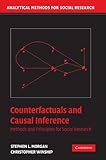Counterfactuals and causal inference: methods and principles for social research
Material type: TextSeries: Analytical Methods for Social ResearchPublication details: New York Cambridge University Press 2007Description: xiii, 319 pISBN:
TextSeries: Analytical Methods for Social ResearchPublication details: New York Cambridge University Press 2007Description: xiii, 319 pISBN: - 9780521671934
- 300.72 M6C6
| Item type | Current library | Item location | Collection | Shelving location | Call number | Status | Date due | Barcode | |
|---|---|---|---|---|---|---|---|---|---|
| Books | Vikram Sarabhai Library | Rack 6-B / Slot 238 (0 Floor, West Wing) | Non-fiction | General Stacks | 300.72 M6C6 (Browse shelf(Opens below)) | Available | 188117 |
Includes bibliographical references (p. 291-316) and index.
Did mandatory busing programs in the 1970s increase the school achievement of disadvantaged minority youth? Does obtaining a college degree increase an individual's labor market earnings? Did the use of the butterfly ballot in some Florida counties in the 2000 presidential election cost Al Gore votes? If so, was the number of miscast votes sufficiently large to have altered the election outcome? At their core, these types of questions are simple cause-and-effect questions. Simple cause-and-effect questions are the motivation for much empirical work in the social sciences. This book presents a model and set of methods for causal effect estimation that social scientists can use to address causal questions such as these. The essential features of the counterfactual model of causality for observational data analysis are presented with examples from sociology, political science, and economics.
(http://www.cambridgeindia.org/showbookdetails.asp?ISBN=9780521671934)
There are no comments on this title.

